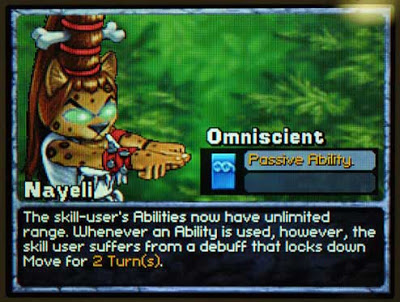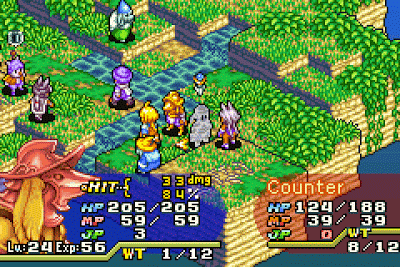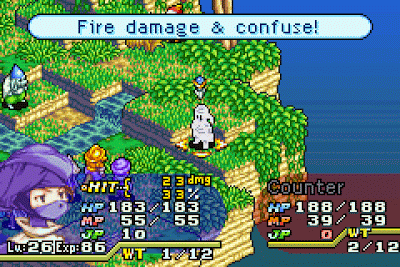Trending
Opinion: How will Project 2025 impact game developers?
The Heritage Foundation's manifesto for the possible next administration could do great harm to many, including large portions of the game development community.

Featured Blog | This community-written post highlights the best of what the game industry has to offer. Read more like it on the Game Developer Blogs or learn how to Submit Your Own Blog Post
Writing in video games is not just about the story. In some games there's tons of game rules informations to be conveyed to the player and it got to be done quickly and efficiently.

Good writing in video games is crucial. Note though that writing does not equal story. Story is part of the writing but let's not forget menus, tutorials, items and skills description, etc.. When I write for games, I often rewrite the same texts 5 or 6 times with a strong emphasis on reducing the word count to the strict minimum. In that regard, Dawn of Heroes for the Nintendo DS is appaling by it's inefficiency. It seems 70% of the texts could have been removed for a better effect.
What is Dawn of Heroes?
DoH is a regular tactical RPG where you control up to 5 characters on a battlefield and use their abilities against a range of enemies. The game's mechanics are interesting and the game itself features nice pixel arts along with a cartoony 3D renderings of the battles. It features a very large range of abilities and often require to read their effects descriptions in order to take good decisions in battle. Since this is an important part of the game, I'll focus on the skills descriptions in this article.
Nayeli's Omniscient ability
At first sight, the description is a bit long. One important information is highlighted in yellow, which helps a little but other important informations remain "hidden" in the block of text.
First sentence : "The skill-user" is totally redundant to the screen itself. We are looking at a character's skill and as such know who it is affecting.
Second sentence : "Whenever an abilitiy is used" is the trigger, which is important informations. "the skill user" is used again with the same redundancy effect, followed by "suffers from a debuff", which doesn't add anything to the important information following : "locks down Move for 2 turns."
Suggested rewrite :
Grants unlimited range to all abilities.
Using an ability locks down movement for 2 turns.
Two small sentences, displayed one over the other for easy "bullet point" style reading. The text is reduced by almost 50%. It went from 28 words down to 15 words.
Yuji's Sweep Kick
It's a bit shorter than the previous text but there is still a lot of uninformative bits that can be removed.
Important informations : "disables Move", "1 turn" and "area of effect".
There's a redundancy : "Places a Curse debuff" and "This debuff". What's more is that both can be removed without losing any important information.
Suggested rewrite :
Disables Move for all enemies within area of effect for 1 turn.
All this babble of "placing a curse" and "debuff" is totally irrelevant to the player. The only thing that matters is what this skill does to who. And as such, the text has been reduced from 18 words down to 12. The new rewrite also places the effect of the ability (Disables Move) right at the start of the text, instead of at the end. This is a good thing since it is the most important information.
Reynald's Amnesia
Important informations : "an (one) enemy", "locks down Abilities that cost MP" and "1 turn".
This text contains the same redundancy than the previous one with the use of "Curse debuff" and "This debuff". In fact, all texts I've seen in the game so far are pretty much consistent with this structure (while not very efficient, at least they are consistent).
We could move the "1 turn" to the end of the text and then remove everything before "Locks down abilities". This would get us :
Locks down Abilities of an enemy that cost MP to use for 1 turn.
20 words down to 14. This sentence could be made even shorter (and easier to understand) if there was a single word or expression to designate "abilities that cost MP to use" in the game's rules. Let's say it is "Spells" (as opposed to "Abilities", which would be abilities with cooldown effects instead of MP cost). We could rewrite this sentence again :
Locks down Spells of an enemy for 1 turn.
I'm down to 9 words. This little change would affect all other places were "Abilities that cost MP to use" and would considerably reduce the word count (and reading time) over the course of the game.
Disabling magic is a common rule in RPGs and TRPGs and is often known as the "silence" effect.
Silence an enemy for 1 turn
6 words. From 20 words we went down to 6. Feels good doesn't it?
Assassination
This one is totally confusing as it requires the player to do mental maths in order to understand it's meaning. Why write 800% ? Is it relevant to the player to read a percentage? Computers excel at doing math but the writer on this one decided it would be more interesting to let the player do the work.
Let's go straigth to a rewrite :
Deals 5 Physical Damage.25% chance to deal 40 additional damage. Cannot be avoided.
19 words down to 14. There is not much to remove here but there is great improvement in changing how it is explained. By replacing the 800% with the actual number, we remove a useless strain on the user's brain.
Comparison with an established title
In comparison, let's look at another successful tactical RPG : Final Fantasy Tactics Advance. The rules of this game are deeper, more complex, yet they manage to elegantly fit it all in the tiny display screen of the Gameboy Advance.

It might take a while to the untrained eye to read the whole screen here but an accustomed player will have no problem finding what he needs to know. This is the preparation of a simple attack. We see the health and magic points of both attacker and defender, the damage dealt and the success rate.
To be fair, DoH does it too with as much elegance. However, where the writing shines in this screen is in the red "Counter" word over the enemy's stats. This single word gives all the information the player needs : attacking this character will trigger a counter-attack. The understanding of this word lies in the rules of the game. The player already knows what a counter is and if by chance it's the first time he encounters this skill, he needs but a single time to learn and remember it's meaning.
Short, elegant, single word.

The little ninja here, controlled by the player, prepares a special attack. Again we can see the damage and success rate of the ability. The "Counter" word is here again, showing that the enemy will counter-attack if possible but it is now gray as the ninja is too far from him to allow a counter. The change of color is all that is required to convey that information.
Finally, we can see a short text at the top of the screen : "Fire damage & confuse!". 4 words. Can it get any shorter than that? All the required information about the attack is in these 4 short words. The player recognizes the meaning of those four words through his previous understanding of the game's rules. Elegant!
Getting to this level of abstraction though does require the game to efficiently convey those rules first. Typically the rules will be introduced one by one and if done right should be easily assimilated by the player. Finaly Fantasy Tactics Advance here have it easy by re-using a common language established in previous games of the series.
Conclusion
Writing is crucial to the design of a game and to the player's understanding of it's rules. Clarity first ; all informations required to make a choice should be easily available but also easily readable! Every extra word on screen has the potential to hide important informations and / or confuse the player. It's important to re-read and re-write all texts in a game and eliminate everything that do not bear any informations.
Short and to the point, nothing there without a reason.
Read more about:
Featured BlogsYou May Also Like